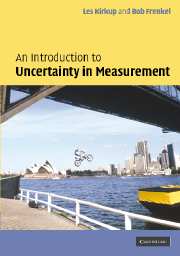 An Introduction to Uncertainty in Measurement
An Introduction to Uncertainty in Measurement Published online by Cambridge University Press: 06 July 2010
For the newcomer, unfamiliarity with the specialist vocabulary of scientific disciplines like physics and chemistry can act as an obstacle to learning those disciplines. What can be even more challenging is that science employs many words such as force and energy that are used in various ways in everyday language. The science of measurement, in particular, has many terms, such as error, uncertainty and accuracy, that also occur in day-to-day use in contexts far removed from measurement. In this chapter we consider terms used in measurement, including those with an everyday or popular meaning such as error, and we clarify their meaning when used in the context of measurement.
Measurement and related terms
Measurement
Measurement is a process by which a value of a particular quantity such as the temperature of a water bath or the pH of a solution is obtained. In the case of length measurement, this might involve measuring the atomic-scale topography of a surface using an instrument such as an atomic-force microscope (AFM), or measuring the length of a pendulum using a metre rule. Values obtained through measurement form the foundation upon which we are able to
test both new and established scientific theories;
decide whether a component, such as a resistor, is within specification;
compare values obtained by workers around the world of a particular quantity, such as the thickness of the ozone layer of the atmosphere;
quantify the amount of a particular chemical species, such as the amount of steroid in a sample of urine taken from an athlete; and
establish the proficiency of laboratories involved with the testing and calibration of equipment.
To save this book to your Kindle, first ensure [email protected] is added to your Approved Personal Document E-mail List under your Personal Document Settings on the Manage Your Content and Devices page of your Amazon account. Then enter the ‘name’ part of your Kindle email address below. Find out more about saving to your Kindle.
Note you can select to save to either the @free.kindle.com or @kindle.com variations. ‘@free.kindle.com’ emails are free but can only be saved to your device when it is connected to wi-fi. ‘@kindle.com’ emails can be delivered even when you are not connected to wi-fi, but note that service fees apply.
Find out more about the Kindle Personal Document Service.
To save content items to your account, please confirm that you agree to abide by our usage policies. If this is the first time you use this feature, you will be asked to authorise Cambridge Core to connect with your account. Find out more about saving content to Dropbox.
To save content items to your account, please confirm that you agree to abide by our usage policies. If this is the first time you use this feature, you will be asked to authorise Cambridge Core to connect with your account. Find out more about saving content to Google Drive.